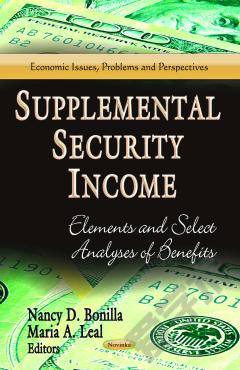Supplemental Security Income: Elements and Select Analyses of Benefits
The Supplemental Security Income (SSI) program, enacted in 1974, is a needs-based program that provides cash benefits designed to ensure a minimum income to aged, blind, or disabled persons with limited income and assets. The SSI program is a means-tested program that does not have work or contribution requirements, but restricts benefits to those who meet asset and resource limitations. In July 2012, the SSI program had more than 8.2 million participants, who received just under $4.6 billion in benefits. In FY2011, the total net cost of the SSI program was $52.9 billion, including $49.0 billion in federal benefit payments. Funding for the SSI program is provided by Congress in the annual Departments of Labor, Health and Human Services, Education and Related Agencies appropriations bill. This book provides select analysis of current benefits of the program, with a focus on income/resource limits and accounts exempt from benefit determinations; and better management oversight needed for children's benefits.
{{comment.content}}








 京公网安备 11010802027623号
京公网安备 11010802027623号